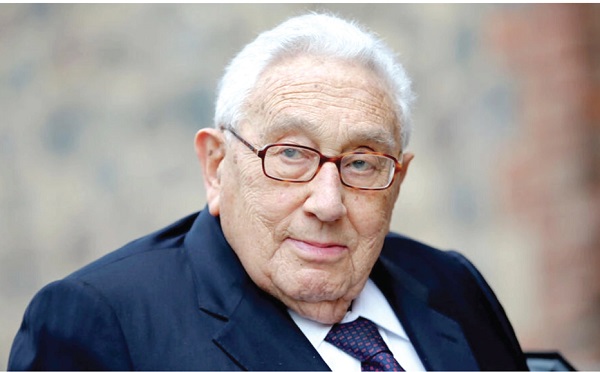
Henry Kissinger — A distinctive and dependable voice on Foreign Affairs
The name Henry Kissinger is an everyday name on the lips of both lecturers and students in International Relations and political lecture halls. He was a prominent name in diplomacy and the US foreign policy practice.
Advertisement
Former and current world leaders took to various platforms to pay their last respects to the former statesman who played a critical and polarising role in the US foreign policy during the Cold War era.
The daughters of former President Richard Nixon, Tricia Nixon Cox and Julie Nixon Eisenhower, in paying their last respects to the statesman, said, “Kissinger’s life story was so unique-and so thoroughly American”.
Glowing tributes
Former United Kingdom Prime Minister Tony Blair, meanwhile, described Henry Kissinger as an artist of diplomacy, saying he was motivated by “a genuine love of the free world and the need to protect it”. Former President George W. Bush Junior paid a glowing tribute to him saying the US had “lost one of the most distinctive and dependable voices on foreign affairs”.
Born in Germany in 1923, the son of a school teacher moved to the United States in 1938 when his parents fled the Nazis. He then became a US citizen in 1943 and served in the US Army for some years and later in the Counter Intelligence Corps.
Henry Kissinger was a distinguished academician as well. Having obtained his bachelors, Master’s and PhD, he went to teach International Relations at the prestigious Harvard University.
National Security advisor
One of the popular books which many students of world politics and international relations have read and reviewed for research purposes is ‘World Order’. In 1969, he was appointed by former President Richard Nixon as the National Security Advisor.
The position gave him enormous influence in US foreign policy. It was Henry Kissinger who coined the quote “America has no permanent friends or enemies, only permanent interests”.
For many students of world or international politics like myself, Henry Kissinger had many sides. Undoubtedly, he was the most powerful US diplomat of the Cold War era. He was very instrumental in Washington’s opening up to China.
He also forged arm control deals with the then Soviet Union and played a role in ending the Vietnam war. Despite these notable achievements, people of different interests critiqued him over human rights issues. People were critical of his Realpolitik style that made him controversial.
Accused of war crimes
He was accused of war crimes when he and former President Richard Nixon conducted a bombing campaign against Vietnamese communists in Cambodia. Over the years, he was subjected to scathing criticisms from those who accused him of prioritising rivalry with the Soviet Union over human rights and supporting repressive regimes over the world, including that of Augusto Pinochet of Chile.
While many hailed Kissinger for brilliance and statesmanship, others branded him a war criminal for his support of anti-communist dictatorship, especially in Latin-America. In his later years, his travels were circumscribed by efforts of some countries to arrest or question him on past US Foreign Policy.
Profound strategic focus
Even within the internal US politics, Henry Kissinger was not liked by others on the political divide. Sitting democrat President Joe Biden waited nearly twenty-four hours after the announcement of his death to issue a statement which talks about how often they strongly disagreed, but acknowledged Kissinger’s fierce intellect and profound strategic focus.
John Kirby, the spokesperson for President Biden on national security stated, “Whether you see eye-to-eye with him on every issue or not, there is no question that he shaped foreign policy decisions for decades, and he certainly had impact”.
The concept of ‘Shuttle Diplomacy’ was made famous by the iconic diplomat in 1973 when he fully employed that to help end the Israeli-Arab conflict and the negotiations of the Paris Peace Accord that helped America pull out from its long nightmare in Vietnam. In the same year, Henry Kissinger won the Nobel Peace Prize for the role he played in ending the US involvement in the Vietnam war.
Nobel committee members
However, this was one of the most controversial decisions ever, as two Nobel committee members resigned over his selection because questions arose over U.S,’ secret bombing of Cambodia. His Vietnamese diplomat counterpart, who was a joint winner, actually declined the award.
Always influential, Henry Kissinger was largely used by most Republican Presidents and, recently, he briefed President Donald Trump on foreign affairs after his election in 2017, suggesting among others, the acceptance of Russian President Vladimir Putin’s occupation of Crimea.
As a student of world politics, it is apparently clear that operations and activities of the U.S, with regard to foreign policy, is, to some extent, predominantly predicated on the influence of Henry Kissinger.
Distinctive and dependable
He said, “Power is the ultimate aphrodisiac”, adding, “A country that demands moral perfection in its foreign policy will achieve neither perfection nor security”. The U.S, indeed, has lost a distinctive and dependable voice in foreign affairs.
Mr Henry Kissinger died at age 100 and it is fair to say that nobody has more experience of international affairs, first as a scholar of the 19th century diplomacy and later as America’s national security advisor and Secretary of State. For the past 46 years, he was a consultant and emissary to monarchs, presidents and prime ministers.
May his soul rest in peace.




